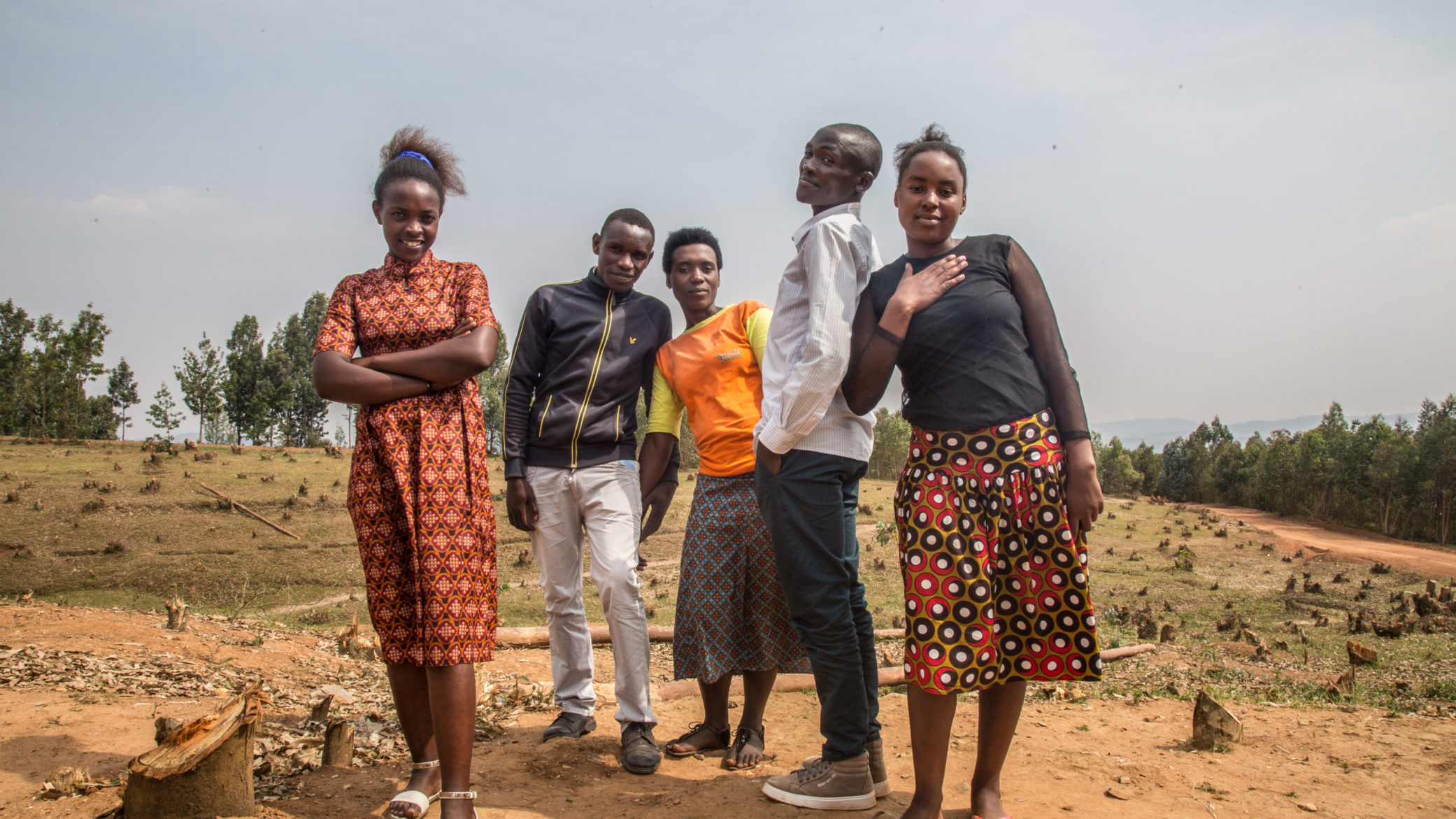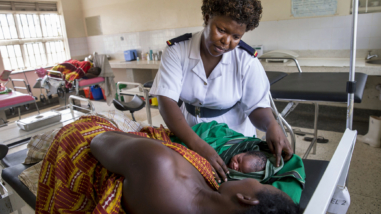2021 was a challenging year. As we turn the page to 2022, I’m hopeful that the clouds will clear, COVID-19 will be managed down to low-or-no mortality, economies will recover, and those hurt hardest by the pandemic – women, girls, young people in school, and other historically excluded groups – will rebound even stronger. At Hewlett’s Gender Equity and Governance (GEG) program, we are doing what we can so our societal and economic structures and systems will accelerate rather than impede progress towards a more equitable and sustainable world where all people can achieve their life aspirations.
The past year was one of transition and change in the GEG program and in the world around us. At GEG, we continued our learning journey regarding diversity, equity, and inclusion, combatting systemic racism, and shifting power to those closest to the opportunities and challenges. We renamed our program “Gender Equity and Governance,” a frame that better represents our work and values. We refreshed three strategies – Global Reproductive Equity (“GRE,” which was launched at the end of the year), Women’s Economic Empowerment (“WEE”), and Transparency, Participation, and Accountability (“TPA”) – the latter two will be released in the next few months. We replaced outstanding Program Officers and an inspirational Program Fellow (as we need to do, given Hewlett’s practice of term limits for its grantmakers) with incredible new team members who have extensive lived experience in Africa: Diakhoumba Gassama, Ousseynou Ngom, and Jennifer Joel joined our team this year; Chris Maloney and Chris Chibwana will join in early 2022. And we hired a new Communications Officer, Carla Aguirre, who is originally from Mexico and has long-term experience with several GEG grantees.
The team made 167 grants to 127 organizations totaling nearly $106 million. These (largely unrestricted) grants helped our grantee partners remain resilient and sustain their critical work despite all the challenges they faced on top of a global pandemic, including a closing civic space, increased attacks to abortion rights, and a plateau or reductions in donor funding. To illustrate how hard 2021 was for our partners, one of our grantees, Epic-Africa, surveyed 1,039 African CSOs in mid-2021 and reported that “68.1% of African CSOs experienced a loss of funding since the start of the pandemic, an increase of 12.4% compared to 2020.” And yet, “40.7% experienced increased demand in services, compared to 31.5% in 2020.”
As management guru Peter Drucker said, “The greatest danger in times of turbulence is not the turbulence; it is to act with yesterday’s logic.” And we will continue to be adaptive to the moment and responsive to what we hear from our grantees and partners, while moving toward a new and – we hope – better normal. We will embark on a new strategy refresh for our Evidence-Informed Policymaking (“EIP”) work and will begin to implement our three refreshed strategies in 2022. And our U.S. Reproductive Equity strategy will need to respond to this precarious moment, where Roe v. Wade is threatened, and reproductive rights remain under siege.
Moving forward, you will see three common themes across all of GEG’s evolving strategies:
Greater thematic and geographic focus
As the 2021 evaluation of our TPA work concluded, our previous strategy was too diffuse, covering 13 thematic areas and spread across both global work and multiple countries. We thus hypothesize that greater focus in our strategies will lead to increased and sustained impact. As we’ve signaled in our TPA refresh process, we will focus most of our grantmaking in TPA on six countries (Ghana, Kenya, Senegal, and Mexico will be our priority countries; Burkina Faso and Tanzania will be “pilot” countries). In our WEE strategy, we will continue to be laser-focused on a specific niche — gender-responsive macro-level economic policymaking — and we will also coalesce around countries in West and East Africa to promote specific policy change, as “success begets success.” Similarly, in our GRE strategy, we will be moving some of our global grantmaking to increasingly concentrate on francophone West Africa and a few countries in East Africa.
Centering equity and shifting power
Equity will increasingly guide our efforts in several ways. Advancing gender equity through an intersectional lens — including the intersections of gender with ethnicity, income, age, or disability — is a pillar of our GEG program. Our grantmaking on reproductive equity in the U.S. recognizes and is combating the reality that safe abortion is becoming less accessible in around half of U.S states, disproportionately affecting people of color and low-income communities, and an outright ban in many of these states is perhaps on the near-term horizon. Our new GRE strategy intends to address inequities across countries and within countries, focusing on geographies and communities with a high need for reproductive health services. Our TPA grantmaking will aim for governments to be more responsive to the voices, needs, and aspirations of women and youth. And our WEE portfolio will strive to promote gender-responsive policies, including those surrounding unpaid care, informal work, social protection, and tax justice, especially in East and West Africa.
Our strategies will increasingly focus on changing power dynamics. Through our TPA grantmaking, we will aim to address the root causes for why governments are not responsive – self-dealing elites have captured the state, media, and other levers of power. In our priority countries, we will seek to build and shift power, especially with women and young people, to address state capture by elites who are motivated by their private interests, not the public interest. We intend to shift power in our WEE, TPA, and GRE strategies to increase domestic pressure on governments to adopt more inclusive policies and increase resources to the priorities voiced by women and girls, including (but not limited to) economic empowerment and sexual and reproductive health, rights, and justice. In our GRE strategy, for example, we recognize that Northern (donor) pressure and commitments made at global events need to be complemented – and led by – increasing domestic pressure to deliver on these commitments.
Specifically, our three new strategies –TPA, WEE, and GRE – will work with and invest in feminist movements to support their leadership and critical role in creating inclusive and sustainable change. For example, in the WEE field, we recognize that even when solutions exist, these solutions are not getting adopted by (mostly male) leaders and policymakers. We will build on our Women’s Funds Initiative and learning from longstanding partners and grantmakers in this field.
Our commitment to equity and power shifting will guide not only our strategies, but also the way we build and live into equitable partnerships. We will keep striving for more equitable funding practices and partnership models. In part, this will entail a concerted effort to shift decision-making and resources to local institutions, social movements, and civil society actors. This reflects an ongoing evolution in our strategies to increase support for national and local actors closest to the issues and best positioned to drive long-term, sustainable change. We will simplify our proposal and reporting processes and remove potential biases towards organizations that think or write like us to help increase grantmaking across all of our strategies to organizations headquartered in the Global South.
Field-building
Finally, field-building – investing in and supporting a set of organizations and people working toward similar goals or to address a common issue through shared learning and collaboration – will continue to be a feature of Hewlett grantmaking, although our field-building efforts will evolve as the fields we work in themselves change and mature. It is a much different task, for example, to contribute to strengthening the reproductive health field that is more than half-a century old; versus TPA, which is less than 20 years old; or gender-responsive macro-level economic policymaking or evidence-informed policymaking, fields which are coalescing and are relatively young.
In our GRE strategy, we are shifting some resources away from Northern International Non-Governmental Organizations (INGOs) and universities to strengthen feminist movements and local sexual and reproductive health, rights, and justice ecosystems and institutions in Africa. We are supporting the WEE field to further expand into macro-level solutions, since WEE has traditionally centered on individual agency and “micro” solutions, such as financial inclusion or women’s entrepreneurship. Regarding TPA, we hope to move the field forward by supporting the development of exemplars in specific countries, while helping to amplify African voices, strengthen institutions, and increase domestic pressure on governments to be more responsive.
There’s much more to learn, and do, in the coming year. But as I reflect on the tough moments and months of 2021, I have been inspired and humbled by the contributions and successes of our partners and colleagues amidst adversity. I know that some headwinds will persist, but I remain confident and heartened by our partnerships, the daily work of the groups and people we support, and their ongoing commitment to make tomorrow just a little bit better than yesterday.



